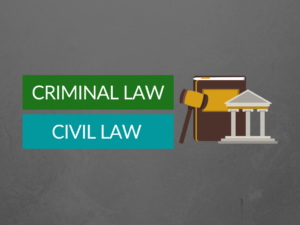Difference Between Criminal and Civil Cases
What is Criminal?
Criminal cases involve actions that are considered to be offenses against society as a whole. They are brought by the government, typically represented by a prosecutor, to punish individuals who have committed crimes.
Examples of Criminal Cases:
- Murder
- Theft
- Assault
- Drug trafficking
- Robbery
Uses of Criminal Cases:
Criminal cases are used to maintain law and order, deter future criminal behavior, and protect society from dangerous individuals. They aim to hold the accused accountable for their actions and enforce punishment.
What are Civil Cases?
Civil cases involve disputes between individuals or organizations, where one party seeks compensation or resolution for a non-criminal wrongdoing committed by another party. They are not brought by the government and differ from criminal cases in terms of the consequences sought.
Examples of Civil Cases:
- Personal injury claims
- Breach of contract
- Property disputes
- Divorce proceedings
- Consumer complaints
Uses of Civil Cases:
Civil cases are used to resolve conflicts, provide compensation or restitution to the affected party, and enforce legal rights and obligations. They focus on finding a fair resolution rather than imposing punishment.
Differences Between Criminal and Civil Cases:
| Area of Difference | Criminal Cases | Civil Cases |
|---|---|---|
| Legal Standing of Parties | Government (prosecutor) vs. Individual | Individual vs. Individual/Organization |
| Purpose | Punishment | Compensation/Resolution |
| Burden of Proof | Beyond a Reasonable Doubt | Preponderance of the Evidence |
| Legal Representation | Public Prosecutor/Defense Attorney | Plaintiff/Defense Attorney |
| Punishment | Fines, Imprisonment, Probation | Compensation, Injunctions, Restitution |
| Jury Requirement | Often | Occasionally |
| Verdict | Guilty/Not Guilty | Liable/Not Liable |
| Statute of Limitations | Varies by Offense | Varies by Cause of Action |
| Examples | Murder, Theft, Assault | Personal Injury, Breach of Contract |
| Primary Parties | Government and Accused | Plaintiff and Defendant |
Conclusion:
In summary, criminal cases involve offenses against society that are prosecuted by the government, aiming at punishment, while civil cases deal with disputes between parties seeking compensation or resolution without criminal punishment. The legal processes, consequences, burdens of proof, and parties involved differ significantly between the two types of cases.
People Also Ask:
- What is the burden of proof in criminal cases?
- Can a person be tried both criminally and civilly?
- What happens in a civil case if someone is found guilty?
- Can a criminal case turn into a civil case?
- Are the rules of evidence the same in criminal and civil cases?
In criminal cases, the burden of proof is “beyond a reasonable doubt.” The prosecutor must prove the guilt of the accused with evidence that leaves no reasonable doubt in the minds of the jury or judge.
Yes, a person can be tried both criminally and civilly for the same action. Criminal cases aim to punish the offender, while civil cases focus on compensating the victim or resolving the dispute.
Civil cases do not have a “guilty” verdict. If someone is found responsible in a civil case, they are deemed “liable” for the wrongdoing. The court may then order them to pay compensation or take other appropriate actions.
Yes, a criminal case can turn into a civil case. For example, if a person is found guilty of assault in a criminal trial, the victim can later sue them in a civil trial seeking monetary compensation for their injuries.
No, the rules of evidence differ between criminal and civil cases. Criminal cases have stricter rules concerning the admissibility of evidence due to the potential deprivation of liberty in case of a conviction.


